There are baby bluebirds in many of my boxes right now, and watching them grow is absolutely riveting. The weather's been great for nesting, not too cold at night, and the rains have been brief with plenty of sun in between. I can't remember a better spring for nesting birds. So far. Exactly one year ago today, I was looking out at six inches of snow, snow heaped on green leaves and piling up atop bluebird boxes full of nestlings. Arrrrgh. I like this spring MUCH better.
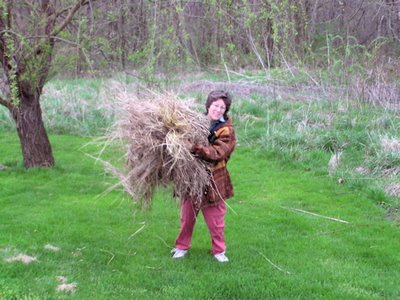
While playing the Easter bunny, I gathered grass for Easter baskets, but also for my nest boxes. I always gather a feed bag full of dry grass early in spring before it all rots down--now is too late. The fast-growing green grass and the spring rains have rotted all that good winter grass to moldy tatters. I store it in the garage and use it for nest changes. Eastern bluebirds get a parasite, the bluebird blowfly, Protocalliphora sialia. The maggots infest the nest, and suck the babies' blood at night. Almost all nests are infested, especially in the second brood, so I automatically change the nests when the babies are about a week old. I just make a new nest from dry grass and take the old one out. Then I count the maggots to see how badly infested the nest was. A bad infestation will be 75-150 blowfly larvae. I always think how good it must feel to the chicks to be blowfly-free at last. If I can't find any evidence of blowflies, I often leave early spring nests alone. By May, though, those blowflies will be busy!
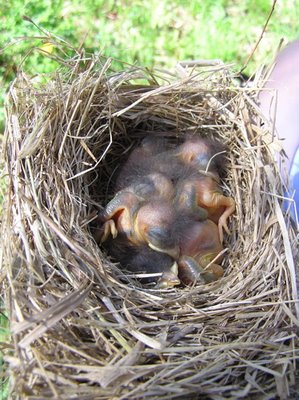
These four-day old nestlings in the Spring Trail box are almost ready for their nest change. I wait until they're big enough to handle safely. One of the eggs in this clutch hadn't hatched, so I took it out. Better that, than it cracks and soils the nest. If an egg hasn't hatched by the time its siblings are two days old, it's not going to hatch. I'm always curious to see if I can tell what went wrong, so I take the egg a good distance from the nest and open it up to see what's what.
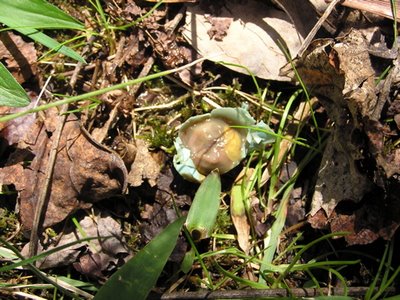 The vast majority of unhatched eggs were never fertilized, but this one died in the shell after about ten days of incubation. I don't know why, but maybe someday an answer will present itself. The thing is to keep asking the questions, and keep looking for the answers.
The vast majority of unhatched eggs were never fertilized, but this one died in the shell after about ten days of incubation. I don't know why, but maybe someday an answer will present itself. The thing is to keep asking the questions, and keep looking for the answers.The very next box Phoebe and I checked had five eggs. If you look closely, you'll see that the topmost and lowest eggs are pipping.
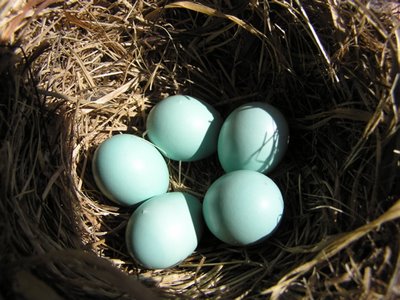 So now I know that the babies will all be hatched by tomorrow morning. The momentary sadness we felt over the chick that died in its shell evaporates. Life surges on in the spring.
So now I know that the babies will all be hatched by tomorrow morning. The momentary sadness we felt over the chick that died in its shell evaporates. Life surges on in the spring.Those of you with a hands-off appreciation of nature may be unsettled by my tales of nest intervention--removing nests, handling young birds, opening unhatched eggs. I know a man who has bluebird boxes in his yard, unprotected by baffles, who never opens them until the end of the season. He's appalled at the way I manage my boxes. He thinks I should leave the birds alone and let nature take its course. But when the bluebirds in his yard mysteriously "abandon" their nests, he doesn't know why; snakes and raccoons have their way with them; parasites weaken the young. Maybe some of his bluebirds make it. Most probably don't.
By contrast, I'm an unapologetic interventionist. I don't handle the birds for fun or profit; I handle them only to help them. Having run nest box trails since 1982, I've figured out how to help them. And I'm not above feeding them when their parents have trouble finding enough insect prey. Last year, 52 fat, healthy baby bluebirds fledged from boxes on my trail. There were a couple of snake incidents, a couple of raccoon incidents, some very cold, wet spring weather...I was trying out a waxed pole that proved emphatically not to work in Ohio! Those poles are all baffled now. In 2004, the best year ever, a whopping 72 bluebirds fledged from our boxes. This year, I'm holding my breath. It could be better than '04. We've got eight pairs of bluebirds (up from our usual total of six), a pair of tree swallows, and a pair of Carolina chickadees in boxes on our land.
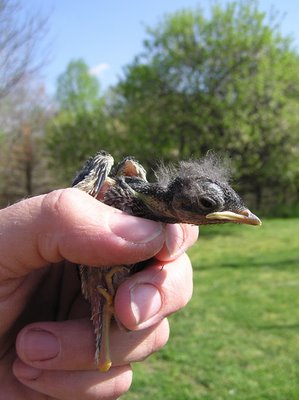 Here's a ten-day-old bluebird, about to be put into its new, parasite-free nest.
Here's a ten-day-old bluebird, about to be put into its new, parasite-free nest.I'm as serious about pumping healthy young birds out as any farmer is about fattening cattle. I've got seven new baffled boxes up on Stanleyville Road, and another couple more to put up. And I'm checking them all once a week, and sticking my nose into their business. And I'm teaching my kids to do the same. Our goal is to overrun this part of the county with bluebirds. It seems to be working.
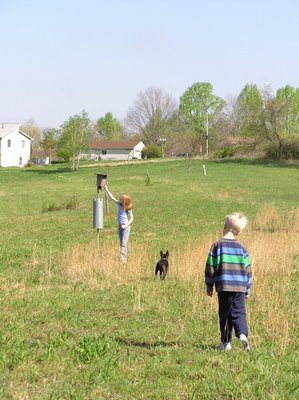






0 comments:
Post a Comment